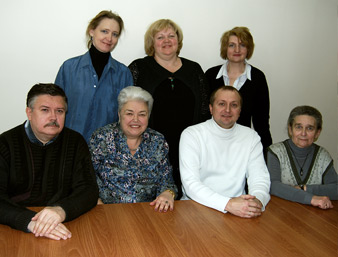
Lyudmilla Novikova’s Scientific School
Selivanova, Natalia L.
[about]
In many respects, an individual life is influenced by meetings with other people who might make a serious impact on their professional career and relationships with friends and colleagues. But there are some special people meeting with whom might define your destiny. One of such destiny-makers was Lyudmilla Ivanovna Novikova (1918-2004).
Lyudmilla Novikova was born on January 22, 1918 in the town of Gorky, Byelorussia. She graduated from the Mechanics and Mathematics School, Moscow State University. After the graduation and until the end of her life she was closely connected with public education. Novikova began her career as a teacher of mathematics. During the Great Patriotic War she was evacuated to the Altai region where she taught mathematics, physics, astronomy, field hygiene, and German at one of the local schools. She was constantly trying to be enlisted in the army as she had completed the program for military field nurses. However, due to the lack of teachers her request was rejected. In 1944, she was appointed Principal of a secondary school in the Moscow region.
Russian social education: times of change?
Selivanova, Natalia L.
[about]
Significant changes that have recently taken place in the Russian society in general and in the system of education in particular, as well as domestic and international challenges make it necessary to analyze the objective reality in the national social education theory and practice, and work out the strategy of its further development. Obviously, this choice cannot be random, and should rather be based on contemporary theoretical and practical foundations. The latter may offer a significant contribution to the theory, which, in its turn, will provide a solid ground for innovations in social education practices and the reevaluation of its efficiency.
The author reflects on the situation in the Russian system of social education based on the analysis of over 2,000 applications and reports submitted to different Russian foundations on various issues within social education. The author had a rare opportunity to analyze both the mainstream and innovative practices of social education by using personal observations, interviewing teachers, school administrators and parents, and also by studying school documents and multiple publications related to social education. All the above made it possible to define key characteristics of the Russian social education and suggest possible ways for its development.




